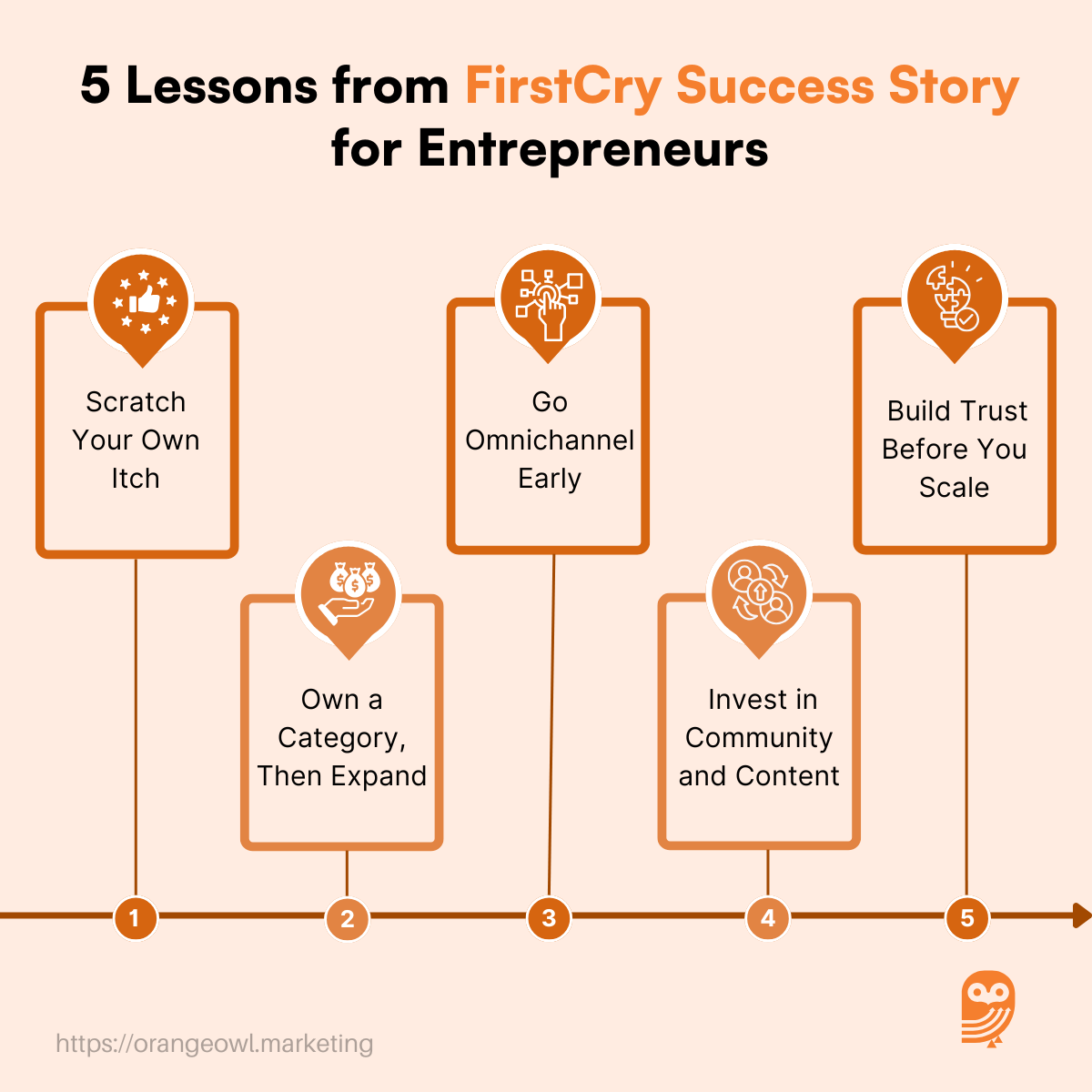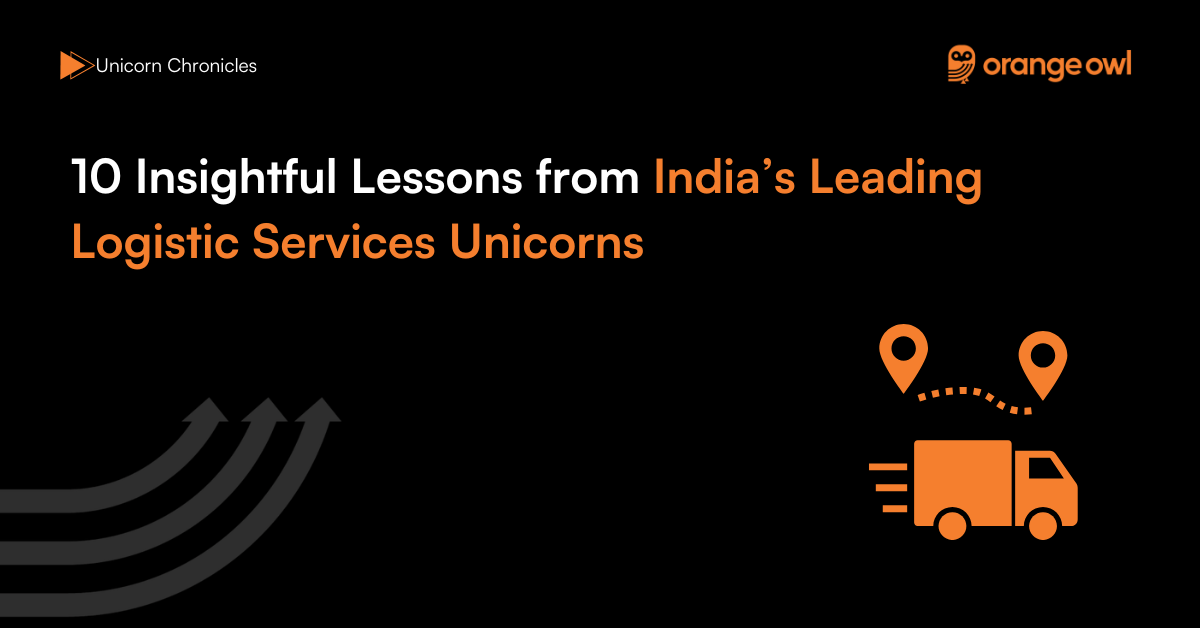FirstCry Success Story: 5 Transformative Lessons for Entrepreneurs
Vivek Goel
May 20, 2025

Table of Contents
Introduction: Building India’s Largest Baby Products Brand
In 2010, Supam Maheshwari—a seasoned entrepreneur and father—faced a common yet pressing challenge: sourcing quality baby products for his child in India. This personal experience unveiled a significant gap in the Indian market—a lack of dedicated, accessible platforms for parents to procure trusted baby and maternity items. Recognizing this unmet need, Supam, along with co-founder Amitava Saha, launched FirstCry with a bold mission: to become the go-to brand for young parents in India.
“As a father, I felt the pain of not getting good baby products. That’s where the idea for FirstCry came from.” — Supam Maheshwari, Founder & CEO, FirstCry
From its inception as an e-commerce platform, FirstCry has evolved into a comprehensive ecosystem catering to parenting needs. As of December 2024, the company boasts over 1,136 modern stores across 508 cities in India, encompassing both company-operated and franchise outlets . This expansive offline presence complements its robust online platform, which offers more than 262,000 stock-keeping units (SKUs) from over 3,600 brands, including global, homegrown, and third-party Indian brands.
FirstCry’s commitment to accessibility and trust has resonated with parents nationwide. The platform has cultivated a substantial user base, with 25 million registered users reported in FY2024 . This growth is further evidenced by the company’s financial trajectory; FirstCry’s revenue surged from ₹1,740 crore in FY2020 to ₹6,575 crore in FY2024, marking a significant upward trend.
In a strategic move to bolster its market presence, FirstCry plans to open 466 new stores across India by FY2028, utilizing proceeds from its initial public offering (IPO) . This expansion underscores the company’s dedication to reaching more parents and solidifying its position as a leader in the baby and kids’ products segment.
FirstCry’s journey from a personal challenge to a nationwide solution exemplifies how addressing a specific need with determination and innovation can lead to transformative success.
Origin Story: From Frustration to Disruption
The idea behind FirstCry was born out of personal frustration. Supam Maheshwari, who had earlier co-founded Brainvisa (an edtech startup later acquired by Indecomm Global), struggled to buy reliable baby products for his newborn. He noticed that unlike Western markets, India lacked brand trust and product availability in this category.
Along with Amitava Saha, Supam launched FirstCry with the aim of curating international brands, making them accessible across India, and bridging the gap in baby product availability for urban and non-metro parents alike.
“We started with a warehouse in Pune, packing boxes ourselves. The belief was strong—we wanted to change how Indian parents shop.” — Supam Maheshwari
The founders focused first on the online model, knowing the product selection and convenience would be key differentiators. Later, they added offline stores to expand reach and build greater consumer trust in Tier II and Tier III cities.
Business Landscape and Challenges
In 2010, the Indian e-commerce market was still nascent. Babycare products were scattered across local stores, and even large marketplaces had limited selection and inconsistent quality. FirstCry decided to focus deeply on just one segment—mothers and babies—and build trust through authenticity, variety, and accessibility.
The challenges were many:
- Consumer awareness about baby products was low outside metros.
- Logistics was tough, especially with perishable or bulky items like diapers and baby gear.
- Brand trust had to be built from scratch in a high-emotion category like parenting.
“This category is emotional. Parents don’t compromise. We knew we had to get trust, quality, and delivery right from Day 1.” — Supam Maheshwari
Rather than competing directly with horizontal marketplaces like Amazon or Flipkart, FirstCry carved out a category-specific niche, offering over 2 lakh+ unique baby and kids products from both Indian and international brands.
Growth Strategies: Omnichannel, Content, and Data-Led Expansion
1. Omnichannel Retail Approach
While FirstCry began as an online-first platform, the company soon realized the power of offline stores—especially in Tier II and III cities where touch and feel played a big role in parental purchase decisions.
“We didn’t want to be just online. Offline was essential for trust—especially in towns where brand exposure is limited.”— Supam Maheshwari
Today, FirstCry has built over 400 franchisee-led stores across India, offering seamless online-offline integration.
2. Building a Parenting Community
The brand didn’t just sell products—it created content, ran loyalty programs, and built parenting forums to keep users engaged. Their campaigns were full of empathy and education.
3. Early Entry into Private Labels
To ensure better margins and quality control, FirstCry aggressively invested in private label products, which now make up a significant portion of their business. These include in-house brands like Babyhug and CuteWalk, trusted by millions of parents.
4. Strategic Acquisitions and Investments
In 2016, FirstCry acquired BabyOye, another babycare startup, helping it consolidate market share. The company also received significant backing from SoftBank, giving it the capital to scale aggressively.
5. Leveraging Data and Personalization
With millions of parents on its platform, FirstCry uses data to personalize recommendations, manage inventory, and optimize delivery routes—ensuring high customer satisfaction.
Marketing Strategy: Trust, Emotions, and Lifecycle Targeting
Marketing at FirstCry has always been deeply emotion-driven—designed to tap into the protective instincts, aspirations, and everyday joys of parenting. Rather than relying solely on hard selling, FirstCry crafts narratives that resonate with the emotional realities of its core audience: young parents. Their campaigns often blend humor, empathy, and education, making them not just promotional but highly relatable and memorable.
One of their key strategies is lifecycle marketing, where communication is tailored to every stage of parenting—from pregnancy to toddlerhood. This ensures that FirstCry stays relevant throughout the customer journey, offering value at each phase.
A standout initiative is their hospital partnership program, where new mothers receive a specially curated “FirstCry Box” filled with baby care essentials. Distributed across hundreds of hospitals, this initiative introduces FirstCry to parents at the very beginning of their journey, creating a powerful first impression while also serving as a smart customer acquisition channel.
Additionally, the FirstCry app plays a central role in deepening engagement. It’s more than just an e-commerce platform—it’s a parenting companion. With personalized product recommendations, loyalty rewards, expert parenting tips, and a vibrant community for discussions and support, the app encourages frequent usage and builds a sense of trust and belonging. Their referral programs further enhance word-of-mouth growth, rewarding users for inviting fellow parents to join the platform—turning customers into brand ambassadors
“We didn’t just want a customer. We wanted a relationship—with the parent and their child through every stage.”— Supam Maheshwari
5 Transformative Lessons for Entrepreneurs
1. Scratch Your Own Itch
Great businesses often originate from personal experiences—and Supam Maheshwari’s journey is a textbook case. As a parent frustrated by the lack of quality baby products in India, he realized he wasn’t alone. This unmet need among millions of parents became the foundation for FirstCry. The insight? If something frustrates you deeply, chances are it frustrates others too. Supam’s personal challenge became a nationwide opportunity—proving that solving your own problem can be a great place to start a business.
2. Own a Category, Then Expand
Rather than chasing multiple markets at once, FirstCry took a focused approach. The company established a stronghold in the baby care category first—offering everything from diapers to strollers with unmatched depth. Only after winning trust in that space did it expand into adjacent categories like kids’ fashion, maternity care, and toys. This strategy of owning one niche before expanding helped the brand create a clear identity and strong customer loyalty. It’s a vital lesson in disciplined scaling.

3. Go Omnichannel Early
While many e-commerce brands chose to remain digital-only, FirstCry recognized a key truth about Indian markets: offline still matters. The brand’s early move into retail stores—through both company-owned and franchise models—helped it build trust in Tier II and Tier III cities, where physical presence reinforces credibility. This omnichannel strategy allowed the company to scale quickly, offer personalized in-store experiences, and reduce last-mile delivery challenges. It’s a prime example of tailoring business models to local consumer behavior.
4. Invest in Community and Content
FirstCry went beyond just being a store—it became a support system for parents. Through parenting blogs, expert Q&A sessions, user forums, and events like baby shows, the company fostered a strong emotional connection with its audience. This content-driven approach helped position FirstCry as not just a retailer, but a parenting partner. By nurturing a community, the brand increased user engagement, retention, and word-of-mouth growth—all vital for a category built on trust.
5. Build Trust Before You Scale
In sensitive spaces like baby care, trust isn’t optional—it’s everything. FirstCry prioritized quality, consistency, and care in every interaction—from curated product listings to customer support. This helped build lasting relationships with parents, who are typically very loyal once they find a reliable brand. Supam Maheshwari consistently emphasized that trust must be earned over time, one experience at a time.
“Trust is fragile—especially in this space. Every experience matters. If you win trust, parents will stay with you for years.” — Supam Maheshwari
Conclusion: FirstCry’s Legacy and the Future of Vertical Commerce
What began as one father’s frustration is today India’s largest baby and kids products platform. FirstCry now operates across more than 400 cities, serving over 25 million registered users, and offering 262,000+ SKUs from 3,600+ brands. It has seamlessly blended online convenience with offline accessibility, creating a truly omnichannel ecosystem that empowers modern Indian parents (source).
But FirstCry’s impact goes beyond numbers. It has pioneered vertical commerce in India, proving that category-focused, community-driven brands can build massive businesses. As it prepares to expand into global markets—including the Middle East—FirstCry’s journey serves as a blueprint for entrepreneurs aiming to build enduring, trusted businesses in niche segments.
“If you truly solve a problem that people deeply care about, you’ll never run out of growth.”— Supam Maheshwari
FirstCry reminds us that entrepreneurship is about empathy, insight, and execution—and that when you build with purpose, scale becomes inevitable.


